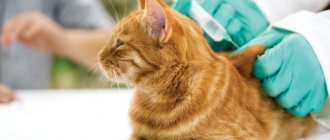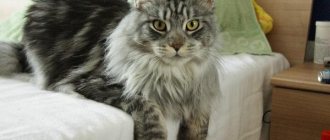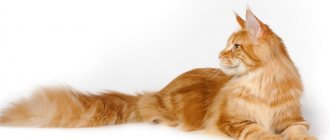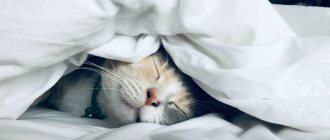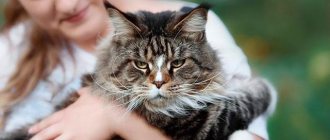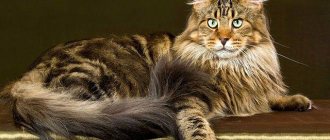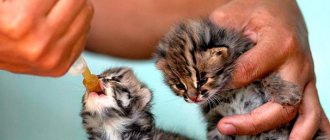Maine Coon is one of the largest breeds of domestic cats. The distinctive features of the breed are, of course, size, endurance, mobility, intelligence, affectionate character, rich and beautiful coat, fluffy raccoon tail, and many other excellent qualities and unique characteristics that distinguish cats from representatives of other breeds. The average weight of a Maine Coon is 8-10 kg, but the weight of some individuals reaches 15 kg.
Have you decided to get such an amazing pet? It is worth taking care and studying information about proper care for him and timely vaccination.
Maine Coon vaccinations - pros and cons
To do or not to do, that is the question. Veterinarians and breeders are still arguing about whether cats need vaccinations. It would seem that there is no discussion here, since vaccinations are done for the benefit of the pet:
- Vaccination helps prevent the development of serious diseases in Maine Coons. Some diseases can also affect humans.
- The immune system of the vaccinated animal is enhanced.
- Some vaccines are used not only for prevention purposes, but also for the treatment of infectious diseases.
- Vaccination will cost the owner much less than complex treatment for a sick Maine Coon.
- If an animal’s veterinary passport does not contain vaccination marks, it will not be possible to travel with it on trains or planes.
But some experts and breeders explain their non-acceptance of vaccinations with the following arguments:
- The administered vaccine is effective only in the first months after the injection.
- Vaccination reduces the production of natural immunity in animals.
- Many vaccines contain mercury and other heavy metals that can cause damage to your pet's nervous system and cancer.
When is vaccination required?
Many owners of Maine Coons and cats of other breeds are sure that if their pet does not go outside, it should not be vaccinated. Veterinarians are rushing to debunk this myth: even an animal that does not leave the walls of its home can become infected with a serious disease.
Some groups of pets are required to be vaccinated. These include:
- Animals that roam freely outside the home. By default, they can come into contact with their homeless brethren.
- Males and cats being prepared for mating.
- Pets that their owners are planning to temporarily rent to a pet hotel.
- Cats that are being prepared to travel abroad or attend exhibitions.
Animals taken from the street must also be vaccinated. Of course, it is difficult to imagine a purebred Maine Coon walking freely along the sidewalks. But if the owner was not sure that his pet had been vaccinated and there is no way to check this fact, it is better to contact a veterinary clinic.
Vaccination procedure
Even if you decide to entrust the vaccination to a veterinarian, you should know some general points in order to properly prepare your pet for the procedure:
1. In order for immunity to develop correctly and vaccination to take place without negative consequences, the animal must be healthy. Therefore, before vaccination, the veterinarian examines the cat, takes the temperature, and interviews the owner. It is also not recommended to vaccinate pregnant cats with vaccines containing live viruses;
2. 10-14 days before visiting the veterinarian it is necessary to carry out deworming. To do this, you should buy drops or tablets at any pharmacy. It is better to save the packaging - the veterinarian will paste the sticker from the drug into the veterinary passport. Without deworming, you will be denied vaccination;
3. You should take your pet to the clinic on an empty stomach, otherwise vomiting and diarrhea may occur due to stress or the vaccination itself. Take a towel or special diaper with you;
4. in the clinic, an unvaccinated kitten should not have contact with the environment and other animals;
5. the procedure itself lasts less than a minute, regardless of which drugs were chosen;
6. After vaccination (usually after re-vaccination), the veterinarian will issue a veterinary passport for the kitten. In most clinics this service is free or very inexpensive. The veterinary passport contains information about all vaccinations; if necessary, on the basis of this, a veterinary certificate is issued for transporting the animal on public transport or exporting it abroad.
What diseases are Maine Coons vaccinated against?
Modern vaccines contain viruses of certain diseases. They are designed to protect Maine Coons from the most dangerous cat diseases. These include:
- Leukopenia. In common parlance - plague. This disease is very easily transmitted and very difficult for cats to carry. The main signs of the disease: fever, damage to the intestines, nasopharynx, heart.
- Rhinotracheitis. A dangerous disease that quickly “sticks” to cats. The pet becomes passive, lethargic, and discharge oozes from its eyes.
- Calcivirosis. The causative agent of this disease is not sensitive to most used disinfectants. Quickly adapts to the conditions around it. Sick cats experience conjunctivitis, body temperature rises, and the mucous membranes become covered with ulcers.
- Infectious peritonitis. Another common disease in cats, often leading to the death of the animal. Main signs: difficulty breathing, lack of appetite, swollen lymph nodes, fever.
- Leukemia. Viral leukemia is transmitted to a healthy animal after contact with a sick animal. The disease affects the hematopoietic system and increases the cat's susceptibility to infections. Typical signs of viral leukemia: depression, lack of appetite, exhaustion, reproductive dysfunction, enlarged lymph nodes, fever.
- Chlamydia. A highly contagious infectious disease, also called feline chlamydial conjunctivitis. Transmitted by airborne droplets, sexual contact and contact. Main symptoms: discharge from the eyes and nose, shortness of breath, lethargy, loss of appetite, frequent urination.
Vaccination against rabies is mandatory for Maine Coons and other cats. The owner must ensure that the animal receives the appropriate vaccine. After all, a sick pet can infect a person. A domestic cat can become infected with rabies after being bitten by a sick animal. Sometimes, for the saliva of a rabid animal to become infected, it is enough just to come into contact with the area of open wounds or the mucous membrane of a pet’s mouth.
The symptoms of the disease depend on the form of rabies. The most difficult thing to recognize is the atypical form. Signs of this disease resemble gastritis: diarrhea, vomiting, exhaustion. With a mild form of rabies, the cat becomes overly playful, literally intrusive. The owners of a sick pet may think that it is choking, but in fact this is how paralysis of the pharynx occurs. In the violent form of rabies, the cat becomes lethargic and aloof, tries to eat inedible objects, gnaw and lick the bite site through which the rabies virus entered.
Features of vaccination of Maine Coons
Before vaccinating the charming giant Maine Coons, it is useful to familiarize yourself with the list of vaccines offered by veterinary clinics and the features of their use.
Types of vaccines
There are two main types of vaccines for cats:
- Alive. They include viral agents of the disease, only slightly weakened. Such viruses are no longer capable of developing the disease, but they force the body to produce appropriate antibodies.
- Dead (synthetic). Laboratory-derived vaccines. They contain dead cells similar to disease viruses. These cells are safe for the animal and cause an appropriate immune response. Such vaccines have a weaker effect compared to live strains of the disease, but are easier to tolerate in animals.
Modern vaccines are practically safe for Maine Coons and do not cause side effects. Of course, provided that the pet is healthy.
Another stumbling block in the selection of vaccines is the purchase of imported or domestic products. Modern veterinarians offer several developments for domestic cats:
- Multifel 4. It is considered one of the most effective Russian-made drugs. It creates lasting immunity. The vaccine is used to form an immune barrier against the most common cat diseases: panleukopenia, rhinotracheitis, calicivirus and chlamydia. Some experts consider one of the disadvantages of Multifel 4 to be the possibility of pet allergies and the absence of rhinotracheitis viruses in its composition.
- Nobivac - Tricat. Imported live vaccine. Contains weakened leukemia, chlamydia, rhinotracheitis and panleukopenia viruses. Nobivac - Tricat should be used with caution in debilitated cats. After vaccination, a deterioration in the animal’s condition is often observed.
- Felovax. A vaccine containing dead viruses, safe for Maine Coons. The drug contains weakened viruses of the four most common feline diseases: panleukopenia, rhinotracheitis, calicivirus and chlamydia.
- Quadrocket. Russian-made vaccine. Includes rabies, panleukopenia, herpes and calcivirosis viruses.
- Purevax. Helps to form stable immunity in Maine Coons to panleukopenia, infectious rhinotracheitis, calcivirus and chlamydia within two weeks after vaccination. The main contraindication to the use of Purevax is individual intolerance to the components of the vaccine.
- Microderm. The action of this live vaccine is aimed at combating lichen infection. Interestingly, the product has a healing effect. That is, with its help you can cure an already infected cat.
Many vaccines are combination vaccines. They include weakened strains of several diseases, for example, rhinotracheitis and calcivirosis. This approach is very convenient, because the animal receives two injections at a time, and not three or four.
Methods of administering the vaccine
The speed of action of the drug and the degree of subsequent protection depend on how the vaccine was administered. Any vaccination should be carried out taking into account the recommendations of the veterinarian or the manufacturer.
Thus, vaccines containing feline panleukopenia virus are administered subcutaneously or intramuscularly. Some vaccines (against peritonitis) are administered intranasally, in other words, as drops in the nose.
Preparing for vaccination
The owner of a Maine Coon can minimize the risk of developing side effects after vaccination. To do this, just follow a few simple preparatory steps:
- Make sure that the coon is absolutely healthy before vaccination.
- Ask your veterinarian what vaccines are available.
- If necessary, you can purchase an alternative to the vaccine offered by the clinic. The product is stored under suitable conditions.
- Purchase only modern vaccines.
- Two weeks before vaccination, the Maine Coon should be dewormed, that is, dewormed. Parasites reduce the body's immune strength.
Maine Coon vaccination schedule
Maine Coon vaccinations begin at a very tender age - 2-3 months. But the introduction of the first vaccine does not make sense without repeated revaccination. Next, the vaccine is given to prevent diseases at certain intervals.
Table: Maine Coon vaccination schedule
| Vaccine name | First vaccination | Revaccination | Subsequent vaccination |
| Panleukopenia | 8-12 weeks | After 2-3 weeks | Annually |
| Trichophytosis and microsporia | 8 weeks | 10 weeks | Annually |
| Rhinotracheitis | 8-12 weeks | After 2-3 weeks | Annually |
| Chlamydia | 10-12 weeks | After 2-4 weeks | Annually |
| Infectious peritonitis | 16 weeks | After 4 weeks | Annually |
| Rabies | 8-12 weeks | — | Once every 1-3 years (depending on the vaccine). |
| Calcivirosis | 8-12 weeks | After 2-3 weeks | Annually |
What to vaccinate with?
There are two types of vaccines - “live” and “dead”.
Live vaccines contain a weakened live virus. Live vaccines are prepared from apathogenic pathogens weakened under artificial or natural conditions. Viruses lose their pathogenic properties and lose the ability to cause infectious diseases, but retain the ability to reproduce. An infection artificially caused by the introduction of a vaccine continues for a certain time, is not accompanied by a clinical picture of the disease and stimulates the formation of immunity to pathogenic strains of microorganisms.
Live vaccines create longer-lasting and stronger immunity than inactivated (dead) vaccines.
When using live vaccines, keep the following points in mind:
- Spontaneous mutations. During the multiplication of the virus in the cat’s body, unpredictable changes in the genetic structure and the return of virulence (pathogenicity) of a given microorganism are possible. In this case, the cat will get really sick.
- Coinfection (joint infection) with a “wild” virus. Simultaneous infection with a vaccine virus and a wild one is very dangerous, although unlikely.
- If the cat's immune system is weakened, vaccination may lead to the development of the disease.
Due to the fact that live vaccines are made on the basis of living microorganisms, a number of requirements must be observed to ensure the preservation of the viability of microorganisms:
- live vaccines should be stored and transported at a temperature of 4-8 ° C;
- freezing live vaccines does not affect their properties;
- live vaccines quickly lose their immunogenic properties at room temperature;
- loss of vacuum (violation of the integrity of the ampoules) can lead to the death of the drug.
Inactivated (dead) vaccines contain the entire microorganism that has been killed. Viruses are killed by physical (temperature, radiation, ultraviolet light) or chemical (alcohol, formaldehyde) methods.
For “dead” vaccines, immunity begins to develop immediately after administration, for “live” vaccines - on the 6-7th day: in the first days, viruses actively multiply, and only then an immune response begins to develop.
“Dead” vaccines are not able to multiply in the body: immunity is developed from the small number of killed microbial bodies (or their fragments) that are introduced. In this regard, dead vaccines are safe - they cannot lead to the development of a viral disease. But at the same time they cause less effective and long-lasting immunity.
The safety of dead vaccines can also be questioned: chemicals added to boost immunity can cause serious adverse reactions and complications in the liver and/or kidneys.
The question of the comparative safety and effectiveness of “live” and “dead” vaccines remains open.
The next vaccination is carried out when the kitten is one year old, it includes a comprehensive vaccination and a rabies vaccination. Then every year you need to repeat these two vaccinations without revaccination. In this case, the animal will be protected from all common infections.
The list of vaccinations for cats includes mandatory and recommended vaccines:
- The mandatory list includes vaccines against panleukopenia, calicivirus, rhinotracheitis and rabies. Rabies vaccination is always given separately, other infections are vaccinated with a polyvaccine;
- The list of recommended vaccinations includes the fairly common chlamydia and leukemia.
What to do after vaccination
After vaccination and revaccination, the Maine Coon needs to be quarantined. The latter is necessary so that the animal that has been vaccinated has time to develop antibodies to the disease. While in quarantine, the Maine Coon should not go outside or have contact with other animals.
An isolated pet needs to be fed well and provided with rest. It is better to discuss the specific diet during this period with your veterinarian.
The exact period of isolation depends on the type of vaccination and the general condition of the kitten or adult. The more complex the vaccine (it protects against more diseases), the more difficult it is for the cat’s body to produce antibodies. Consequently, the pet needs more time to adapt.
The average isolation period is 7-14 days. The exception is the rabies vaccination. After it, the Maine Coon must be in quarantine for at least 30 days.
Possible complications after vaccination
After administering the vaccine, the owner should observe the animals for a week. During this period, a number of signs and symptoms may appear that are the result of an allergy to the biocomponents of the drug. The most common side effects from the vaccine are:
- inflammation of the skin at the injection site;
- diarrhea and vomiting;
- apathetic state.
Important. If the Owner has observed at least one of these symptoms in the cat, the animal should be immediately shown to a veterinarian.
Do I need to get vaccinated?
For cat owners, the need for regular vaccinations is not as clear-cut as for those who have a dog. Most cats live in city apartments and do not come into direct contact with possible sources of deadly infection. But there is one “but”: you yourself can bring the infection on shoes, clothes or other objects that have been in the external environment. The secretions of sick cats (saliva, urine, feces), and with them pathogens, enter the soil. You bring particles of this soil in the form of dust and dirt home on your shoes. This is a very likely scenario, although the risk is less than for animals walking outside. Don't rely on chance. Do not think that it is extremely unlikely that your cat will become infected in this way. When your cat actually gets sick, it won't matter to you whether the chance of infection was 50% or 0.5%.
For some diseases, the mortality rate is very high (for example, 50-70% of cats die when infected with panleukopenia). Rabies is fatal in 100% of cases, including in humans. You can become infected with rabies not only from other cats and dogs, but from almost any animal, including rats and mice, which are common prey for cats.
The vaccine contains a specific set of viruses that have been weakened or “killed” so they cannot cause disease. But their introduction into the cat’s body stimulates the production of antibodies. They accumulate in the body after the vaccine is administered, and when a live virus enters the body, the antibodies kill it. Even if vaccinated animals get sick, they tolerate the disease easily and in a non-life-threatening form.
Unvaccinated animals do not have these antibodies in their blood, and the body takes considerable time to produce them. And the more microbes that enter the body, the more antibodies are needed to neutralize them. Sometimes the animal’s body simply does not have time to produce the required amount of antibodies and the cat gets sick. In kittens, the immune system is not yet formed and works very slowly, so young animals are more susceptible to infectious diseases.
